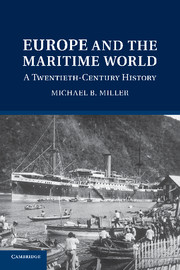Crossref Citations
This Book has been
cited by the following publications. This list is generated based on data provided by Crossref.
Harlaftis, Gelina
2014.
The Onassis Global Shipping Business, 1920s–1950s.
Business History Review,
Vol. 88,
Issue. 2,
p.
241.
Jones, Geoffrey
2014.
The Cambridge History of Capitalism.
p.
169.
Ekberg, Espen
Lange, Even
and
Nybø, Andreas
2015.
Maritime entrepreneurs and policy-makers: a historical approach to contemporary economic globalization.
Journal of Global History,
Vol. 10,
Issue. 1,
p.
171.
Bosma, Ulbe
and
Webster, Anthony
2015.
Commodities, Ports and Asian Maritime Trade Since 1750.
p.
1.
2015.
A World History of Rubber.
p.
142.
Wenzlhuemer, Roland
2016.
The ship, the media, and the world: conceptualizing connections in global history.
Journal of Global History,
Vol. 11,
Issue. 2,
p.
163.
van Fossen, Anthony
2016.
Flags of Convenience and Global Capitalism.
International Critical Thought,
Vol. 6,
Issue. 3,
p.
359.
Antonopoulos, Constantinos N.
2016.
Why the New Maritime Geographies Matter.
Geography Compass,
Vol. 10,
Issue. 8,
p.
346.
Hyslop, Jonathan
2016.
The Encyclopedia of Empire.
p.
1.
Hein, Carola
2016.
Port cities and urban waterfronts: how localized planning ignores water as a connector.
WIREs Water,
Vol. 3,
Issue. 3,
p.
419.
Steel, Frances
2016.
The Encyclopedia of Empire.
p.
1.
Ghemawat, Pankaj
and
Jones, Geoffrey G.
2016.
The Laws of Globalization and Business Applications.
p.
56.
Boon, Marten
2017.
Business Enterprise and Globalization: Towards a Transnational Business History.
Business History Review,
Vol. 91,
Issue. 3,
p.
511.
Heerten, Lasse
2017.
Ankerpunkte der Verflechtung.
Geschichte und Gesellschaft,
Vol. 43,
Issue. 1,
p.
146.
PETERSSON, NIELS P.
2018.
Managing a “People Business” in Times of Uncertainty: Human Resources Strategy at Ocean Transport & Trading in the 1970s.
Enterprise & Society,
Vol. 19,
Issue. 1,
p.
88.
VALL, NATASHA
2018.
A view from the wharf: historical perspectives on the transformation of urban waterfront space in Stockholm during the twentieth century.
Urban History,
Vol. 45,
Issue. 3,
p.
524.
Giacomin, Valeria
2018.
The transformation of the global palm oil cluster: dynamics of cluster competition between Africa and Southeast Asia (c.1900–1970).
Journal of Global History,
Vol. 13,
Issue. 3,
p.
374.
GIACOMIN, VALERIA
2018.
The Emergence of an Export Cluster: Traders and Palm Oil in Early Twentieth-Century Southeast Asia.
Enterprise & Society,
Vol. 19,
Issue. 2,
p.
272.
Claver, Alexander
and
Knight, G. Roger
2018.
A European role in intra-Asian commercial development: The Maclaine Watson network and the Java sugar trade c.1840–1942.
Business History,
Vol. 60,
Issue. 2,
p.
202.
Reyes, Victoria
2018.
Port of Call: How Ships Shape Foreign-Local Encounters.
Social Forces,
Vol. 96,
Issue. 3,
p.
1097.





